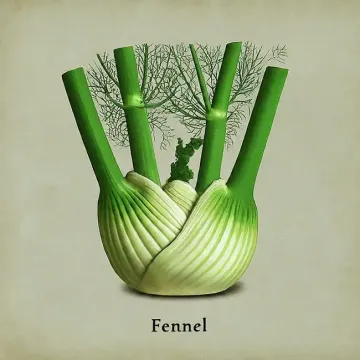Fennel (Foeniculum vulgare) is an aromatic herb native to the Mediterranean region, where it has been cultivated for thousands of years. The ancient Egyptians, Greeks, and Romans revered fennel for its culinary, medicinal, and even mystical properties. In Greek mythology, fennel was associated with Dionysus, the god of wine and revelry, symbolizing knowledge and understanding. The Romans used fennel to flavor their dishes and as a key ingredient in traditional medicine. Over time, fennel spread throughout Europe, Asia, and eventually to the Americas, becoming a staple in various cuisines and herbal traditions.
Health Benefits of Fennel
Fennel is packed with nutrients and offers several health benefits:
- Digestive Aid: Fennel seeds are commonly used to alleviate bloating, indigestion, and other gastrointestinal issues. They help relax the muscles in the digestive tract, promoting smooth digestion.
- Anti-inflammatory Properties: Fennel contains anethole, a compound with potent anti-inflammatory and antioxidant properties, which may help reduce inflammation in the body.
- Rich in Nutrients: Fennel is an excellent source of vitamin C, fiber, potassium, and manganese, contributing to overall health and well-being.
- Hormonal Balance: Fennel has phytoestrogenic properties, which can help balance hormones, particularly in women during menopause.
- Antimicrobial Effects: Fennel has been traditionally used for its antimicrobial properties, helping to combat bacteria and fungi.
Culinary Uses of Fennel
Fennel is a versatile herb with a distinct, slightly sweet flavor reminiscent of licorice or anise. Every part of the fennel plant can be used in cooking:
- Bulb: The fennel bulb is often sliced and used in salads, soups, stews, and roasted vegetable dishes. Its crisp texture and sweet flavor add a refreshing element to many dishes.
- Fronds: The feathery fennel fronds are perfect for garnishing dishes or adding a mild fennel flavor to salads, sauces, and dressings.
- Seeds: Fennel seeds are commonly used in spice blends, sausages, and baked goods. They can also be chewed after meals to freshen breath and aid digestion.
- Stems: The stems can be chopped and added to soups and stews for an additional layer of flavor.
Growing Tips for Fennel
Fennel is a relatively easy herb to grow in the home garden, thriving in various climates and soil types. Here are some tips for growing fennel:
- Soil and Location: Fennel prefers well-drained, loamy soil with a neutral to slightly alkaline pH (6.0-7.5). Choose a sunny location in your garden, as fennel needs at least six hours of direct sunlight daily.
- Planting: Fennel can be grown from seeds or transplants. Sow seeds directly in the garden after the last frost, spacing them about 12-18 inches apart. Fennel can also be started indoors and transplanted outside once the seedlings are strong enough.
- Watering: Keep the soil consistently moist but not waterlogged. Fennel has a deep root system, so it benefits from regular watering, especially during dry spells.
- Fertilization: Fennel doesn't require heavy fertilization. A balanced, all-purpose fertilizer applied once at planting time should suffice. If your soil is particularly poor, consider adding compost or organic matter to enrich it.
- Pest and Disease Control: Fennel is generally resistant to pests, but it can attract aphids, slugs, and snails. Use natural deterrents like neem oil or diatomaceous earth to protect your plants. Fennel is also prone to root rot in overly wet soil, so ensure proper drainage.
- Harvesting: Fennel bulbs can be harvested when they reach about the size of a tennis ball, typically in late summer or early fall. Cut the bulb at the base, leaving the roots in the ground if you plan to regrow the plant. Seeds can be harvested once they turn brown, and fronds can be snipped as needed.
- Companion Planting: Be cautious when planting fennel near other herbs and vegetables, as it can inhibit the growth of some plants. Fennel is best planted in its own space or with other herbs that tolerate its allelopathic effects.
By following these tips, you can enjoy a bountiful harvest of fennel in your home garden, adding both beauty and flavor to your outdoor space. Whether used for its health benefits or its culinary versatility, fennel is a valuable addition to any garden.

